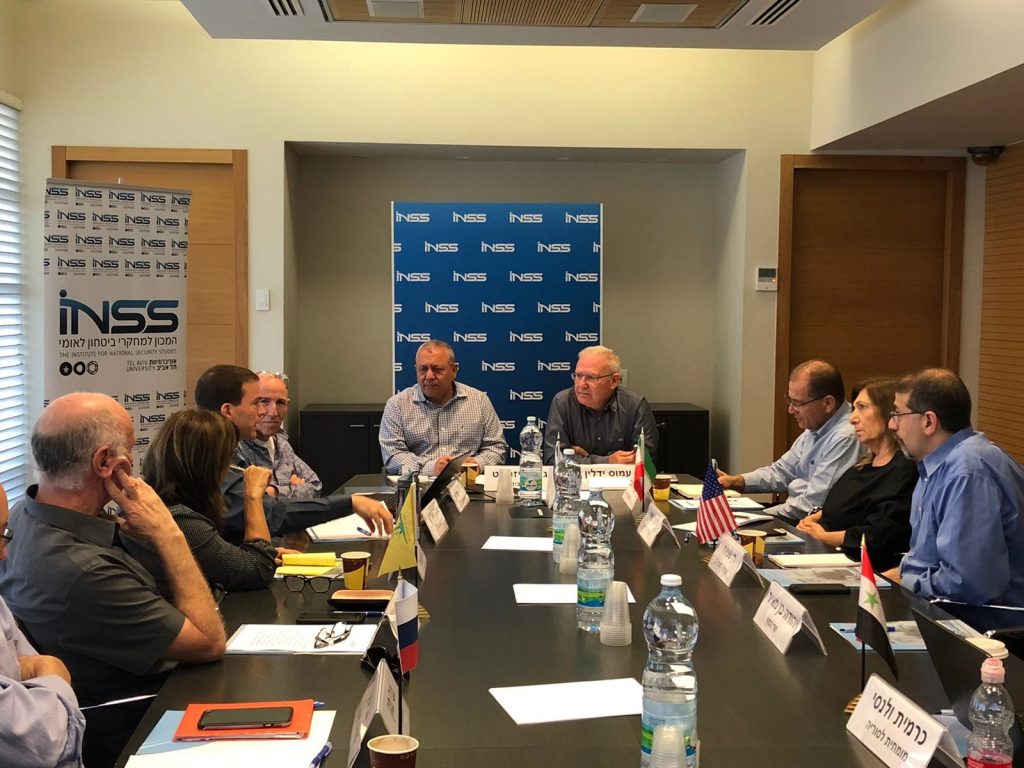 The Institute for National Security Studies (INSS) conducted a simulation to examine various scenarios dealing with the State of Israel’s northern front, titled: “Between a Third Lebanon War and a First Northern War.” Participating in the simulation were INSS researchers, including former IDF Chief of Staff Lt. Gen. (ret.) Gadi Eisenkot, who recently joined the Institute as a Senior Research Fellow. The simulation focused on Israeli security cabinet discussions, which included the top military leadership and the political echelon, in the course of two combat scenarios: a “Third Lebanon War” – a confrontation with Hezbollah in Lebanon; and a “First Northern War” – a wider confrontation also involving Syria and additional theaters such as Iraq. Similarly discussed was the prospect of a preventive war on Hezbollah, and specifically, against the organization’s precision missile project.
The Institute for National Security Studies (INSS) conducted a simulation to examine various scenarios dealing with the State of Israel’s northern front, titled: “Between a Third Lebanon War and a First Northern War.” Participating in the simulation were INSS researchers, including former IDF Chief of Staff Lt. Gen. (ret.) Gadi Eisenkot, who recently joined the Institute as a Senior Research Fellow. The simulation focused on Israeli security cabinet discussions, which included the top military leadership and the political echelon, in the course of two combat scenarios: a “Third Lebanon War” – a confrontation with Hezbollah in Lebanon; and a “First Northern War” – a wider confrontation also involving Syria and additional theaters such as Iraq. Similarly discussed was the prospect of a preventive war on Hezbollah, and specifically, against the organization’s precision missile project.
The first scenario closely resembled the actual escalation between the IDF and Hezbollah of September 2019 – but with different outcomes. As with the actual event, Israel launched an attack within the framework of its “campaign between wars” (CBW) operations, on an al-Quds facility close to Damascus, in which several Hezbollah operatives were killed. In parallel, Israel attacked an element of Hezbollah’s precision guided missile conversion project in Beirut. In response, Hezbollah launched an anti-tank missile at a military ambulance on the northern border and, using unmanned aircraft (UAVs), attacked the division headquarters in Biranit. Contrary to the September event, in the scenario that served as the basis of the simulation, the Hezbollah attacks killed eight Israeli soldiers and officers.
Pursuant to these developments, a security cabinet discussion was held (as part of the simulation) on an appropriate Israeli response. The discussion focused on the need to respond forcefully to the killing of the troops but without escalating into a broad confrontation on the northern front. In that context, various options were discussed – from containing the event to exploiting it in order to deliver a significant blow to Hezbollah, with an emphasis on its precision missile project.
In the simulation’s second scenario, Israel, in accordance with security cabinet decisions, carried out a limited strike against dozens of Hezbollah targets in Lebanon, which led to a high number of fatalities within the organization’s ranks. Hezbollah retaliated by launching dozens of missiles and rockets at Israel, bringing about the deaths of 12 civilians. In parallel, Hezbollah forces carried out a ground incursion into Israeli territory, clashing with IDF forces in the north. Compounding the incidents on the northern border and in Lebanon, the Iranian Revolutionary Guards al-Quds Force launched precision guided missiles from Syria at Israel, inflicting great damage (but with no casualties) on the Haifa oil refinery. In tandem, the Syrian military raised its state of alert and Iranian surface-to-surface missiles were deployed in Syria.
Against the background of these developments, the security cabinet discussion focused on an Israeli response to the incidents, on multi-front war, and on seeking appropriate mechanisms for terminating the operation. Among the main issues discussed during the simulated security cabinet sessions:
The current risks inherent in Israeli CBW activity, with a focus on the escalatory dynamic that is liable to make “routine” Israeli CBW action lead to escalation into a broad confrontation and even war.
The dilemma of exploiting an unplanned war to level a blow against the precision guidance project versus postponing such a war for the sake of carrying out a planned preventive strike.
The ramifications of a ground incursion into Israeli territory: the need to drive out the incursion force, to deploy to prevent further incursions, and to retaliate forcefully for the violation of Israeli sovereignty. In parallel: the impact on public option of such an incursion, in terms of both the sense of security and the way in which the outcomes of the confrontation are perceived.
What might be the mechanisms for ending such a confrontation? How might big powers (the United States and Russia) be able to help end the confrontation under given circumstances?
What should the military and political objective of such a war be, from Israel’s standpoint? What might a future arrangement vis-à-vis the northern front look like?
No comments:
Post a Comment